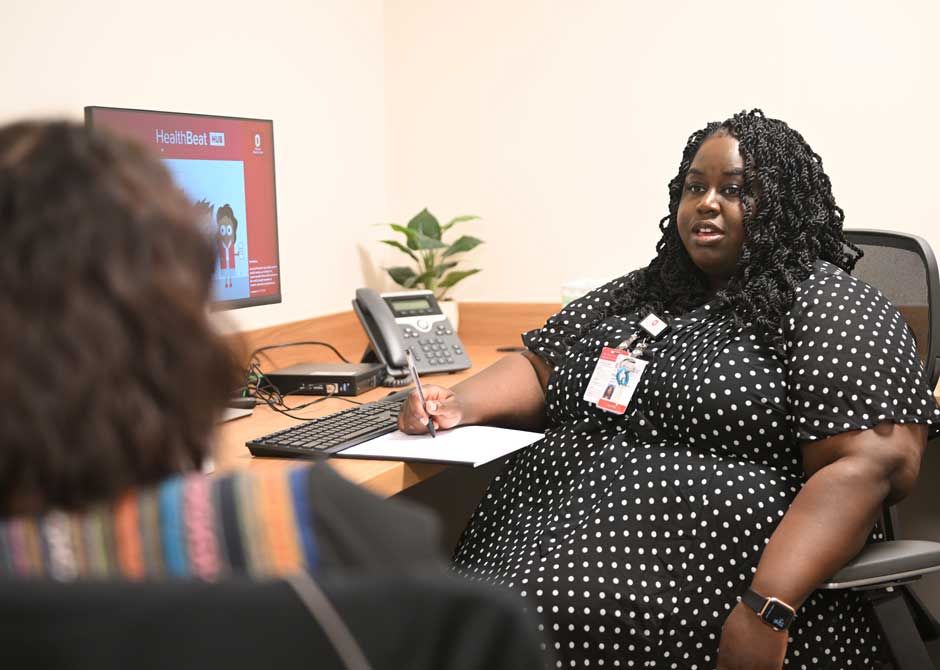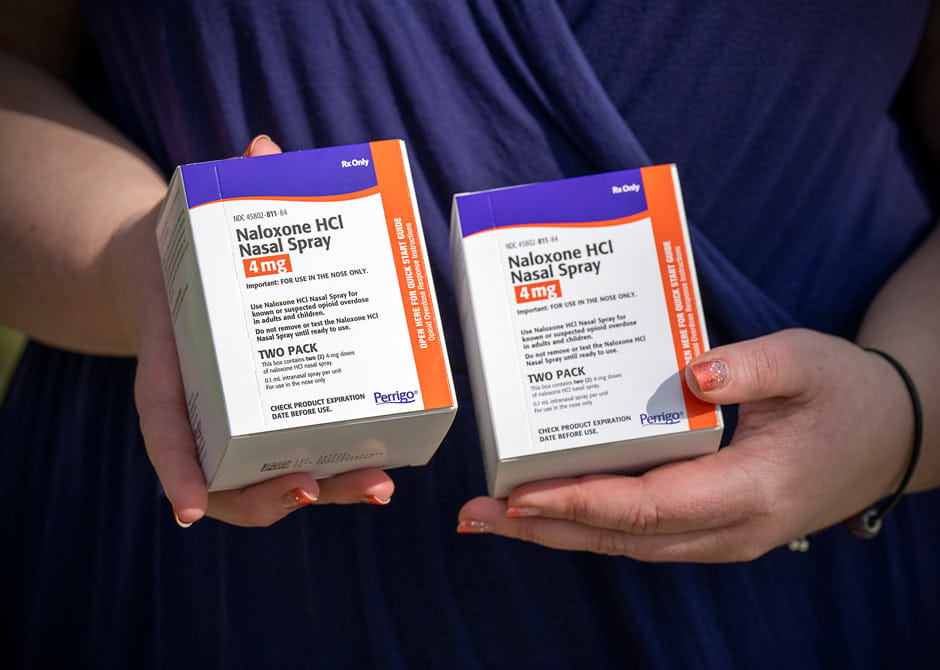
If you or a loved one is struggling with an opioid addiction, you might feel scared or hopeless that you’ll ever take back control of your life. It can be difficult to even know where to turn for help.
The addiction medicine team at The Ohio State University Wexner Medical Center in Columbus, Ohio, can assure you that recovery is possible with evidence-based treatment methods and compassionate, respectful health care providers, who are specially trained in substance use disorders.
Opioid use disorder can be very dangerous and has become a public health crisis in many places in the United States. We’re doing our part to help combat the opioid epidemic from both a clinical and research standpoint, employing the most advanced techniques in treatment while studying what causes addiction and the best ways to prevent it.
Why seek treatment for opioid use disorder at Ohio State?
We know recovery from opioid use disorder is possible because we help many people every year find long-term sobriety and restore their lives. We do this in a safe, healing environment, making us one of the leading recovery centers in Ohio. In fact, The Ohio State University Talbot Addiction Medicine, located in Talbot Hall, home of most of our addiction services, has a patient satisfaction score of 97%.
Other key highlights of our program include:
- We have capacity – We know time is of the essence when you’re in crisis or you make the decision to get sober. Currently, there is no waitlist for our inpatient and outpatient services. We recently opened a new, 15-bed residential unit to provide a safe, supportive environment for people in recovery to further stabilize and start their treatment. This allows us to serve even more people and help them have better outcomes.
- We’re home to a Level IV medical withdrawal management unit – Depending on how severe your opioid use disorder is, we offer the highest level of care for medical withdrawal management from opioids. No one else in central Ohio can provide this type of care.
- We provide every level of care – Ohio State’s treatment of opioid use disorder is unique in Columbus, because you can have all your treatment in one place. There’s no need to go to another place when you need partial hospitalization, residential or outpatient care. We’ll follow you every step of the way, even if you relapse.
- We treat chronic opioid use disorder – We don’t put time limits on how long you have to transition from one level of care to the next. We understand everyone progresses at their own speed.
- We can treat mental health disorders at the same time – Conditions like depression or bipolar disorder are often linked to substance use disorder, and because we’re a large academic health institution, we’re able to manage dual diagnoses.
What is opioid use disorder?
Now considered a public health crisis, opioid use disorder affects an estimated 1.6 million people in the United States. It’s a type of substance use disorder that involves a problematic pattern of opioid misuse that causes health problems or impairs daily life. People with the disorder also find it difficult to quit taking opioids.
Opioids are a class of drug, some of which are commonly prescribed after major injury or surgery, to treat severe pain. They do this by blocking pain signals between the body and the brain. Examples include oxycodone, hydrocodone (Vicodin) or morphine. Stronger opioids, some of which are illegal for any use, include heroin and fentanyl.
For some people, opioids produce a feeling of euphoria. When someone begins to lose control over opioid use, it can lead to opioid use disorder. Over time, you build up a tolerance and must take more of the drug for the same effect or to avoid withdrawal symptoms.
It’s important to remember that opioid use disorder is a chronic brain disease and not a failure of someone’s character. Opioid use disorder often requires medical treatment from professionally trained experts.
What are symptoms of an opioid use disorder?
There are various signs and symptoms people can experience whether they’re using opioids, have an opioid use disorder or are going through withdrawal.
Signs someone is taking opioids include:
- Drowsiness
- Shallow breathing
- Slurred speech
- Dizziness
Symptoms of opioid use disorder can include:
- Craving or having a strong desire to take opioids
- Taking large amounts of opioids or taking them longer than prescribed
- Using opioids despite the negative physical, mental or social consequences they may be causing
- Wanting to stop taking opioids but being unable to quit
- Spending a lot of time thinking about opioids, getting them, using them or recovering from use
- Having difficulty fulfilling duties at work or home due to using opioids or recovering from use
- Giving up social or recreational activities because of opioid use
- Using opioids in dangerous situations, such as driving or operating machinery
- Building up a tolerance to opioids, having to use more to get a similar effect
- Experiencing withdrawal symptoms when you don’t use opioids
Opioid withdrawal symptoms include:
- Generalized pain
- Diarrhea
- Nausea and vomiting
- Chills and fever
- Dilated pupils
- Restlessness or general anxiety
- Elevated blood pressure
- Sweating
- Insomnia
Opioid addiction treatment options at Ohio State
Treatment for opioid use disorder begins with an initial evaluation during which our addiction medicine experts will thoroughly examine the physical, psychological and social aspects of your addiction. This will help us determine what type and level of treatment might be most beneficial to you.
Typically, we’ll use a combination of behavioral therapies and medications for most people in treatment to help them understand and overcome triggers as well as avoid using opioids, especially when stressful situations arise.
Types of treatment provided at Ohio State Talbot Addiction Medicine at Talbot Hall and our outpatient community centers include:
- Detoxification – Withdrawal from opioids typically isn’t life-threatening, but our experts can help ease discomfort and ensure your safety while you detox from opioids.
- Medications – Previously called medication-assisted treatment (MAT), medications for opioid use disorder (MOUD) is based on the concept that treating opioid addiction may require medications, which include buprenorphine (Suboxone) and naltrexone (Vivitrol).
- Psychological/behavioral therapy – Individual counseling or group therapy might be necessary to support your recovery efforts. We also might use cognitive behavioral therapy and motivational enhancement therapy.
- Continued support groups – We also sometimes recommend people participate in mutual help groups, like Narcotics Anonymous, SMART Recovery, Celebrate Recovery and others, for further support following inpatient and outpatient treatment.
Levels of care and special programs include:
Inpatient detoxification
As a Level IV medical withdrawal management unit, we offer the highest level of care in detoxification from drugs or alcohol. We’re the only facility in central Ohio with this level of distinction. We have 25 withdrawal management beds available.
Residential treatment
For those needing further stabilization as they begin treatment, we now have an in-hospital, 15-bed residential unit in which people can live for up to 30 days. This eliminates the added stress of homelessness, unsafe living situations, lack of transportation and basic self-care and gives those in our care the ability to focus on making lifelong changes. The goal of residential care is to get you back to independent living and set you up for success in your recovery journey.
Partial hospitalization
After an inpatient stay, some people may not be ready to return fully to home or work. This program allows you to spend several hours here each weekday, participating in individual and group therapy sessions to help in your recovery from opioid addiction. This typically lasts two to three weeks.
Intensive outpatient program
The next level at Ohio State is intensive outpatient treatment, which is a six-week program designed for you to maintain family and work responsibilities. We can manage your medications as well as provide various types of therapies during the time spent here each week.
Outpatient services
We continue the work of our more intensive programs on an outpatient basis. We offer both individualized therapy and weekly group therapy to help you return to normal, everyday living. We also offer specialized groups for people with similar experiences that are run by licensed professionals.
Recovery program for expectant mothers
The Ohio State Wexner Medical Center has a special program for people who are pregnant and also have an opioid use disorder. Called Substance Abuse, Treatment Education and Prevention Program (STEPP), this weekly clinic in our Maternal Fetal Medicine department provides those who are expecting a child with personalized high-risk obstetrics care, addiction treatment and counseling.
Pain and wellness outpatient program for prevention
This program addresses the potential for opioid addiction before it occurs. People who have been prescribed opioids can participate weekly in individual and group therapy to gradually and safely reduce and, eventually, end opioid use.
Support for people with traumatic brain injuries
The Traumatic Brain Injury (TBI) Network treats adults dealing with both brain injury and drug or alcohol abuse. We understand that people with both conditions require unique support and resources, and we’re one of the only hospitals in the nation providing this type of care. Our goal is to help each individual adapt to his or her new life without substance use.
Community outreach for opioid use disorder
 Recovery cannot be sustained in isolation or without support. To encourage awareness and engage the community and individuals who may be struggling with substance use, the addiction medicine team is dedicated to outreach.
Recovery cannot be sustained in isolation or without support. To encourage awareness and engage the community and individuals who may be struggling with substance use, the addiction medicine team is dedicated to outreach.
We participate in Project DAWN, which is a network of Ohio-based programs that provide free take-home naloxone kits without a prescription. Naloxone (also known as Narcan) is a medication that can reverse an opioid overdose.
Ohio State provides naloxone in pharmacies at East Hospital, Doan Hall, The James, Talbot Hall and all inpatient facilities. We also support community distribution efforts.

